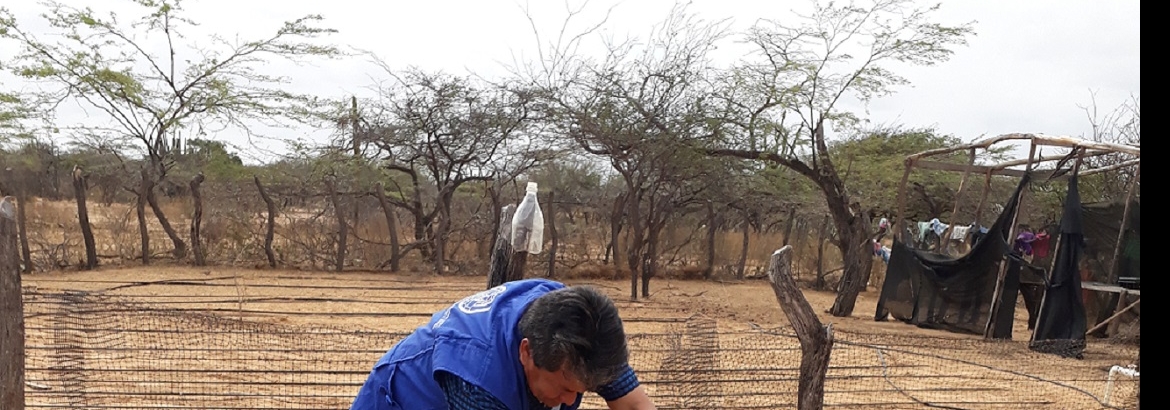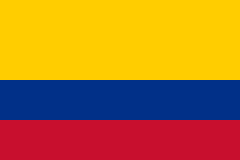IOM Vision
IOM, in partnership with strategic actors, seeks to strengthen institutional and community capacities on preparedness and response to emergency or crisis situations, to reduce the risks and vulnerabilities of affected populations (internally displaced persons - IDPs -, former combatants, migrants, and host communities) and support sustainable recovery, community stabilization and peacebuilding at national, regional and local levels. The humanitarian and recovery responses and peacebuilding strategies are included in the IOM Colombia Strategy (2015-2020) signed with the government (Objective 2: Contribute in emergencies’ and disasters’ situations response and risk management, and Objective 3: Facilitate peacebuilding).
Objective
Saving lives and protecting people on the move
Internally displaced persons and people affected by disasters.
IOM aims at strengthening the capacity of the Government of Colombia (GoC), communities and key stakeholders with regards to temporary accommodation management. This will be done through workshops to identify and refer protection risks, design community plans, and to strengthen the coordination and management of temporary accommodation.
In addition, people affected by natural disasters, as well as IDPs, will be assisted with temporary accommodation and household items, including items for sleeping, food preparation and storage, thermal comfort support, lighting and personal clothing.
IOM plans to improve the community water infrastructure of indigenous groups in La Guajira through the maintenance and repair of water supply systems (cleaning and maintenance of wells, maintenance and repair of pumps with solar panels), provision of water filters and training on the cleaning and maintenance of pumping systems.
Objective
Driving solutions to displacement
The activities will benefit indigenous communities; victims of violence, former combatants; local population who have access to the System of Truth, Justice and Reparation; children and youth benefited by GBV prevention projects; public officials trained on GBV and information management related to peace agreement implementation; and Colombian victims who are living abroad.
Programming that seeks to mitigate potentially destabilizing circumstances in communities:
- Local authorities improve their capacities in drug consumption prevention strategies through the implementation a comprehensive program of specific prevention tools and models, which will be carried out together with the GOC’s Ministry of Justice (MOJ).
- Community organizations and other local civil society organizations have increased capacity to reduce the risks of exclusion and social stigma related to drug consumption through training workshops carried out together with the GOC’s Ministry of Justice (MOJ).
- Support the self-construction of longer-term, sustainable houses for indigenous IDPs through the provision of materials (including wood), working uniforms, construction tools and the delivery of solar panels. This activity will be complemented with trainings to the beneficiaries on construction provided by the Government.
- Implement food security projects for indigenous IDPs through the establishment of home gardens and the provision of technical assistance.
- Prevention of gender-based violence in indigenous IDPs through awareness-raising and the implementation of workshops with the community.
- Strengthening of indigenous traditional authorities on conflict resolution through workshops and technical assistance.
- Strengthened capacities of local entities and organizations on planning, management and monitoring for the implementation of the policy for victims of violence through technical assistance.
- The Ministry of Interior has tools for planning, management and monitoring for the execution of the policy for victims of violence, with the establishment of a system of information that monitors the actions implemented by local entities.
- The Unit for the Victims Assistance and Reparation has the capacities for the implementation of the public policy for victims of violence, the use of differential approach on gender and youth and for the assistance of victims living abroad, through the provision of policy recommendations for the renewal of the Law of Victims; the implementation of initiatives of reparation or return of victims; the design of a strategy of assistance to victims with gender and youth differential approach; the implementation of affirmative actions with differential approach; and the training to consulates on registering, assistance and orientation to victims living abroad.
- The Special Jurisdiction for Peace increases its capacity to implement the processes of justice, through timely management of information and the use of methodologies to guarantee the participation of victims of violence.
- Victims of violence improve their access to measures of rehabilitation and satisfaction, and to actions that contribute to the adequate investment of compensation resources, through meetings for Comprehensive Reparation and psychosocial support.
- The Unit for the Victims Assistance and Reparations strengthen their capacities to implement the Comprehensive Individual Reparation Strategy through the provision of a methodology to improve the Model of Comprehensive Reparation.
Programming to support former combatants from former guerrilla group (FARC):
- Lead Gender-Based Violence (GBV) prevention plans and economic empowerment initiatives through the implementation of a GBV prevention strategy, and provision of training and seed capital for women.
- Increase their capacities for income generation through training for work, promotion of income generation projects and employability.
- Strengthen their technical and administrative capacities for income generation initiatives through technical assistance, financing, and training for work.
- Increase their capacities and knowledge to implement income generation projects or access to employment, through skill training and psychosocial support.
- Improve their capacities, skills and tools for income generation activities through technical assistance, training and strengthening of associations.
- Improve capacities of the Agency for Reintegration and Normalization (ARN) to implement the Strategy of Community Reintegration of ex-combatants of the former guerrilla (FARC) through the generation of inputs for Territorial Agendas for Community Reincorporation based on community participation, and the support to reconciliation and community initiatives, in the framework of the Development Plans with Territorial Approach (PDET).
Programming to encourage resilient communities and prevent violence:
- Children and adolescents improved their capacities to recognize their rights and apply actions of self-care, as a mechanism of prevention of recruitment and use by organized armed and criminal groups, through the implementation of a pedagogic process.
- Parents, caregivers, teachers, directors and community representatives implement methodologies for the protection of children and adolescents as a result of the pedagogic process to strengthen their capacities.
- Parents, caregivers, teachers, directors and community representatives change their perception of culture of illegality and enrollment to illegal armed groups, through the implementation of strategies for recognition of children's rights.
- Children, adolescents and their families have mechanisms to promote and strengthen mutual care through psychosocial workshops.
- Community and institution networks improve their capacities to protect and prevent the violation of rights of children and adolescents, through the identification and strengthening of networks.
Programming to Build Peace:
- Capacities of the Colombian State entities and civil society organizations strengthened for the development and implementation of peacebuilding initiatives through the implementation of actions to strengthen State Entities in the development of peacebuilding initiatives; strengthening the Entities of the comprehensive system of truth, justice, reparation and non-repetition for peacebuilding Entities; actions that facilitate access to the comprehensive system of truth, justice, reparation and non-repetition for peacebuilding; and support to peacebuilding initiatives developed and implemented by civil society organizations.
- Capacities of Colombian State entities and civil society organizations strengthened for the development and implementation of community stabilization, development, environmental conservation and reconciliation strategies through the implementation of strategies for community stabilization, development, environmental conservation and reconciliation.
- Colombian State institutions implement strategies and tools to promote peaceful coexistence in the territories through technical support to National Police on rights-based approach and community policing, as well as the strengthening of Presidency of the Republic on its capacity to support the respect to life and integrity of the population under special protection.
- Strengthening of the territorial deployment and operation of the Comprehensive System of Truth, Justice, Reparation and Non-Repetition (SIVJRNR) in an articulated, harmonious and effective manner, in order to promote the participation and access of the victims of the armed conflict, those responsible, appearing, witnesses, third parties and society in general in the mechanisms provided by the entities of the System, through i) strengthening of the territorial and articulated deployment of the SIVJRNR and ii) development of joint pedagogy and communication strategies.
- Territorial entities strengthened on their capacities to manage, process, store and deliver information on the actions of their competence associated with the commitments of the Peace Agreement through the implementation of an assessment on 170 municipalities on their capacities to manage, process and deliver information related to the Framework Implementation Plan (PMI), and strengthening actions in the reporting of information on 32 municipalities.
- Increased access of victims of armed conflict to the Special Jurisdiction for Peace, through the strengthening of the Attorney General of the Nation (PGN) office, on the promotion of mechanisms of participation, targeting especially women organizations.
- Victims of armed conflict have access to truth, justice, reparation, and no repetition through file preservation that contribute to the investigation of cases.
- Victims of armed conflict increase their participation on the Comprehensive System of Truth, Justice, Reparation and Non-Repetition (SIVJRNR) through the implementation of mechanisms by the Attorney General of the Nation (PGN) to guarantee the victims rights at the local level.
- Increase of technical and operative capacities of entities that are part of the Comprehensive System of Truth, Justice, Reparation and Non-Repetition (SIVJRNR) through the provision of technical and operative methodologies and strategies.
- Victims of armed conflict and Civil Society organizations improve their participation on the mechanisms established by the Comprehensive System of Truth, Justice, Reparation and Non-Repetition (SIVJRNR) through the support to the strategies that promote the participation of victims and technical assistance to victims, ex-combatants and other groups that participate in the SIVJRNR.
Colombia
The map used here is for illustration purposes only. Names and boundaries do not imply official endorsement or acceptance by IOM.
Figures are as of 31 December 2023. For more details of IOM's operational capacity in country, please see the IOM Capacity section.









